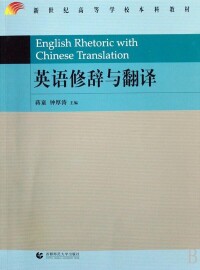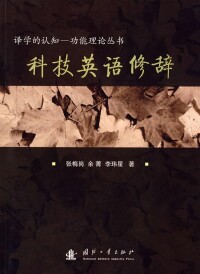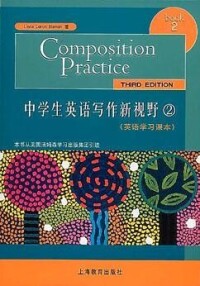英語修辭
英語修辭
英語修辭,它主要指那些沒有相對固定格式的修辭性寫作技巧,它與語法、語言結構和辭彙的關係密切,只是為了修辭和立意新穎的緣故,對之做了一些調整。舉一種情況進行說明:為了增加文采,強化文章的表現力,常常避免重複使用同一個辭彙,而另選他詞。這種無固定格式可循的消極修辭手段被稱為Elegant Variation(求雅換詞)。

英語修辭
英語的修辭可以分為消極修辭和積極修辭兩大類。
如在Elizabeth Razzi寫的題為10 Ways to Lose Pounds 的文章中,“減肥”的表達竟有8種,文筆活潑,文采燦然:1. Try to shed a few extra pounds? 2. Studies show these efforts may shave off the pounds quickly. 3. Here are ten simple strategies that can help melt away your fat forever. 4. …like a logical way to peel off a few pounds. 5. …roughly the amount needed to burn off one pound. 6. You must eat less to lose weight. 7. A key obstacle to dropping extra pounds is after-dinner snacking. 8. 10 Ways to Lose Pounds. 以上8句中的斜體字讓我們欣賞了英語辭彙的活力與風采。遺憾的是,大部分精彩的用詞不能直譯。
求雅換詞的手法之一是大字小用,或小詞大用。如:Don’t take the low-fat label as a license to eat. 句子寫得精彩,最難忘的是其中license一詞。它是用途很廣的大詞。用在這裡給人一種“頭小帽大”的感覺,新穎別緻。譯文很難挽留此韻。(不能因為食品標明低脂肪,而敞開食用。)再如:If the term sounds unscientific to 20th-century ears,let us remember there is a definite connection between marshy lands and malaria… (如果這個術語對生活在20世紀的人聽來不科學的話,那就讓我們記住在沼澤地和瘧疾之間有一定的聯繫……)。求雅換詞的手法之二是科技辭彙和日常用詞的“錯位”。如:Na?ve rats and frogs are said to have reacted wildly to such proposed experimented situation. Na?ve用於現代生物學時的含義為:not previously subjected to experimentation or a particular experimented situation.(據說,首次用來作實驗的鼠和蛙對這種設定的環境改變都有劇烈反應。)再如:However,there are plenty of people who like tennis. It is the megagame. Mega的含義是兆,百萬,是一個科技英語的詞綴。使用在這裡新義溢出。(但是許許多多的人喜歡網球,這是一項十分普及的運動。)
它主要指那些有相對固定格式的修辭性寫作技巧。常見分類如下:
(Lexical Stylistic Devices)
metaphor(比喻),metonymy(借代),personification(擬人),irony(反語),hyperbole(誇張), understatement(低調),euphemism(委婉語),contrast(對照),oxymoron(矛盾修辭法),transferred epithet(移就),pun(雙關),syllepsis(異敘),zeugma(粘連),parody(仿擬),paradox(雋語),chiasmus(交叉)
(Syntactical Stylistic Devices)
repetition(反覆),catchword repetition(聯珠),chiasmus(交叉),parallelism(平行結構),antithesis(反對),rhetoric question(設問),anticlimax(突降)
(Phonetic Stylistic Devices)
alliteration(頭韻),onomatopoeia(擬聲)
馬克·吐溫在其著名遊記A Tramp Abroad中,有這樣一句:We had plenty of company in the way of wagon-loads and mule-loads of tourists------and dust. 句末的-----and dust看似尋常一筆,其實是一種不可多得的妙句,使用了英語中anticlimax的修辭格。如果不能識破,則讓對照閱讀原文者“飲恨”。如:同路的有許多旅客,有乘馬車的,也有騎騾子的——一路塵土飛揚。/ 我們的旅伴真不少,有乘馬車的,有騎騾子的,還有滾滾塵土呢。
1. Parody(仿擬)如果譯者功底不凡,能知作者之所“仿”,那麼,理解與翻譯也就“水到渠成”。如:Clearly,when it comes to marriage,practicing beforehand doesn’t make perfect. 可以譯成:顯然,在婚姻問題上,婚前同居並不能令婚姻生活趨於完美。對待“仿擬”修辭格的方法之一是還原。所謂還原,即故意撇開成語的引申義,而“硬”用其字面義。如:若流感影響到了腸胃,那就只能飲用點茶水,要吃下其他東西就非常困難了。再如:Little John was born with a silver spoon in a mouth,which was rather curly and large. 英語成語to be born with a silver spoon in one’s mouth的含義是“出生在富貴之家”。這裡,作者不用此引申義,而用字面意思。試譯:小約翰嘴形彎曲,且大得出奇,好像生下來的時候嘴中含了一把銀勺子似的。

相關資料
3. metonymy(借代)借代一般可以保留原文的修辭方式,不會引起誤會,同時讓譯文多了一份詞趣。如:So,during any five-week shape-up,focus more on the tape measure than on the bathroom scale. 譯文A:因此,在此五周的減肥期內,要更多地注重自己的腰圍,而不是自己的體重。譯文B:因此,在此五周的減肥期內,把注意力放在量腰圍的捲尺上,而不是放在浴室的磅秤上。
4. pun(雙關)有許多看似無法在譯文中挽留的原文形式的神韻和風采在譯文中卻得以挽留。如:First gentleman: Thou art always figuring disease in me,but thou art full of error,I am sound. Lucio: Nay,not as one would say,healthy; but so sound as things that are hollow; impiety has made a feast of thee. (整個對話之諧趣盡系雙關辭彙sound。)試譯:紳士甲:你總以為我有那種病,其實你大錯特錯,我的身體響噹噹的。路奇奧:響噹噹的,可並不結實,就像空心的東西那樣響噹噹的,你的骨頭都空了,好色的毛病把你掏空了。
5. alliteration(頭韻)英語辭格押頭韻的手法歷來被認為是不可譯的,但是,面對alliteration,並不意味譯者就無所作為。如下的兩段譯文就做了成功的嘗試。如:Change is part of life and the making of character,hon. When the things happen that you do not like,you have two choices: You get bitter or better. 試譯:變化是生活的一部分,而且也塑造了人的意志品德,親愛的。當你不喜歡的事情發生了,你有兩種選擇:要麼痛苦不堪;要麼痛快達觀。
6. metaphor(比喻)這個metaphor並非狹隘意義上的把A比作B的不使用比喻詞(如as,like,as if等)的暗喻,而是廣義上的英語辭彙的比喻義。換言之,也就是英語辭彙denotation(本義)之外的connotation(轉義)。Peter Newmark在A Textbook of Translation中把英語中的比喻分成四類,令人耳目一新 have suggested elsewhere that there are four types of metaphor: fossilized,stock,recently created and original. 第一類:有學生在作文中寫出如下句子:In the middle of the picnic,it started to rain cats and dogs,and everybody got soaked. 該句子被改為:While we were busy eating a picnic,a storm cloud suddenly appeared and everybody got soaked. 在A Dictionary of American Idioms中,寫道:rain cats and dogs: To rain very hard; come down in torrents------A cliché.美國朋友說: If you use this metaphor,I will doubt if you are my grandfather’s uncle! 第二類:stock(常用的)這是指已被收入詞典,但並不屬於cliché範疇的比喻。第三類的標準應該是:至少目前尚未被收入詞典,同時又讓人接受,並感到新意撲面. 第四類:original這種比喻並非隨處可見,唾手可得。它是靈感思維的產物。這種比喻在詞典上無蹤影可覓,而且連參照物可能也沒有。
7.明喻(Simile) 明喻是一種最簡單、最常見的修辭方法,是以兩種具有共同特徵的事物或現象進行對比,表明本體和喻體的關係,兩者都在對比中出現,其基本格式是“A像B”,常用的比喻詞有as,like,as if,as though等。例如:He jumped back as if he had been stung,and the blood rushedsintoshis wrinkled face.(他往後一跳,好像被什麼東西叮了一下似的,他那張布滿皺紋的臉頓時漲得通紅。)在《品嘗家》一文中老人對“我”的慷慨施捨的反應如同被蜜蜂叮過一樣,生動地刻畫出一個處境凄涼內心卻極度敏感的可憐老人的形象。
8.轉喻(Metonymy) 轉喻(即借代)是通過相近的聯想,借喻體代替本體。例如:My 15 students read Emerson,Thoreau,and Huxley.(我的十五位學生讀了愛默生、梭羅和赫胥黎的作品。)這是典型的轉喻,以 人名借代作品。又如:Against the Oval Earth man,the first card I can play is the analogy of the sun and moon. (面對“地球卵形說”者,我能打的第一張牌是,太陽和月亮的相似性。)文中作者用具體第一張牌來借代抽象的“第一個論據”,更加生動形象,淺顯易懂,也使語言新鮮活潑,富有表現力。
9.擬人(Personification) 擬人是把人類的特點、特性加於外界事物上,使之人格化的修辭格。例如:… four evergreen shrubs stood at each corner,swheresthey struggled to survive the dust and fumes from a busy main road.(……四叢常綠灌木分別位於每個角落,它們忍受著從繁忙的大街上吹來的塵煙,掙扎著活下去。)“掙扎”是有生命的物體的動作,作者給自然的花草賦予了生命,使它人格化。
10. 誇張(Hyperbole)誇張是一種故意言過其實,或誇大或縮小事物的形象,藉以突出事物的某種特徵或品格,鮮明地表達思想情感的修辭方式。例如:Vingo sat stunned,looking at the oak tree. It was covered with yellow handkerchiefs—20 of them,30 of them,maybe hundreds.(文戈坐在那兒望著橡樹驚呆了。樹上掛滿了黃手絹——二十條,三十條,或許幾百條。)此句中20 of them,30 of them,maybe hundreds就是運用了誇張的手法,主觀地渲染了氣氛。
11.反語(Irony) 英語修辭格irony就是說反話,用反面的話來表達正面的意思。這種修辭格可用來進行諷刺,但多數是用來表達一種善意的幽默或俏皮,故意說出與本意相反的話,例如:Slowly the old lady stooped to pick it (the cheque ) up. Her present,her lovely present. With trembling fingers she tore itsintoslittle bits. (老太太慢慢地彎下腰,把支票從地上撿起來,她的禮物,她的可愛的禮物!用顫抖的手指把它撕得粉碎。)老太太八十歲壽辰那天,急切地盼望女兒回家看望她,稍稍安慰她那顆孤寂的心,然而盼來的卻是女兒的一張冷冰冰的支票,這當然不是老人心愛的禮物。故此處her lovely present是典型的irony,是句反話。
12.類比(Analogy)
It is also a form of comparison, but unlike simile or metaphor which usually uses comparison on one point of resemblance, analogy draws a parallel between two unlike things that have several common qualities or points of resemblance.
13.Metaphor(暗喻)
It is like a simile, also makes a comparison between two unlike elements, but unlike a simile, this comparison is implied rather than stated. 隱喻(metaphor)這種比喻不通過比喻詞進行,而是直接將用事物當作乙事物來描寫,甲乙兩事物之間的聯繫和相似之處是暗含的。 For example, the world is a stage./ The diamond department was the heart and center of the store。
14.chiasmus(交叉)
交叉(chiasmus)是英語中一種常用的修辭方式。例如:Knowing something of everything and everything of something.著名學者周海中教授曾在《論英語交叉結構》一文中對這一常用的修辭方式作了全面而深入的研究。他認為,這一修辭格具有很高的美學價值和積極的修辭作用。
保留原文
即: to find an equivalent image. 如:Ani began pounding and yelling to be let out as the car screeched from the parking lot. But rock music blaring from the radio speakers drowned him out. 試譯:當汽車從停車場急速駛過時,Ani開始猛烈敲打和大聲呼喊,但是從車內喇叭發出的搖滾音樂淹沒了他發出的聲音。再如:The policemen who patrolled the big city slum area that summer were sitting on a volcano. 那年夏天,在城市大貧民區巡邏的警察如同坐在火山口上。
實行翻譯“補償原則”

相關資料
